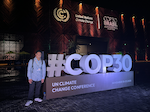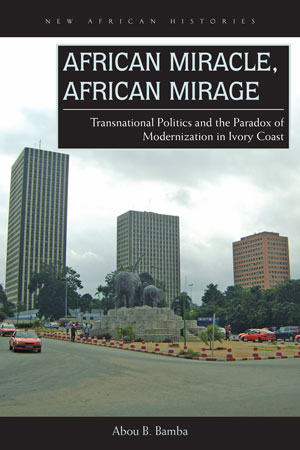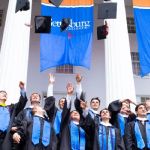

When Gettysburg faculty are not teaching and mentoring students, giving back through service, and fulfilling other responsibilities as professors, they are engaging in research as scholars in their academic areas of expertise.
There are hundreds of papers and pieces of faculty work and research published by leading research journals and academic publications that are collected every year in The Cupola. In 2016, professors also wrote books on a wide range of topics—religion, Chinese motifs, nuclear technology, and Abraham Lincoln, just to name a few.
Below, read more about the collection of books written by faculty and staff in 2016.
Read the 2015 archive of College authors and the complete archive of books written and edited by faculty.
• Jesusmania!: The Bootleg Superstar of Gettysburg College by Devin McKinney, Archives Assistant in Special Collections of Musselman Library
• The Goddess: Myths of the Great Mother by Prof. Chris Fee
• Redeeming the Great Emancipator by Prof. Allen Guelzo
• Italian Prisoners of War in Pennsylvania: Allies on the Home Front, 1944-1945 by Prof. Alan Perry
• African Miracle, African Mirage: Transnational Politics and the Paradox of Modernization in Ivory Coast by Prof. Abou Bamba
• The Midlife Crisis of the Nuclear Nonproliferation Treaty by Prof. Emeritus Peter Pella
• Circles on the Mountain: Bosnian Women in the Twenty-First Century by Prof. Emerita Janet Powers
• En Busca de la Ciudadanía: Los Movimientos Sociales y la Democratización (In Search of Citizenship: Social Movements and Democratization in the Dominican Republic) by Prof. Emelio Betances
• St. Teresa of Calcutta: Missionary, Mother, Mystic by Prof. Emeritus Kerry Walters
• Finding Perfect Joy with St. Francis of Assisi: 30 Reflections by Prof. Emeritus Kerry Walters
• Gendered Geographies in Puerto Rican Culture: Spaces, Sexualities, Solidarities by Prof. Radost Rangelova
• China Reinterpreted: Staging the Other in Muromachi Noh Theater by Prof. Leo Yip
• Third Person References: Forms and Functions in Two Spoken Genres of Spanish by Prof. Jenny Dumont
• Implementing a One-Address CPU in Logisim by Prof. Charles Kann, Computer Science
 Jesusmania!: The Bootleg Superstar of Gettysburg College
Jesusmania!: The Bootleg Superstar of Gettysburg College
–Devin McKinney, Archives Assistant in Special Collections of Musselman Library
The social and cultural history of the late 1960s and early 1970s is a lifelong interest of McKinney's. A group of students, professors, and a renegade seminarian at Gettysburg College performed Jesus Christ Superstar even after a UK pop impresario threatened legal action against amateur groups performing the work before its Broadway debut. Through original documents, recordings, and interviews, McKinney gives the behind-the-scenes scoop on a performance that courted controversy with both the college administration and the Lutheran church.
“Beyond fulfilling my own curiosities as a historian, my hope was that readers would be as entertained by the story and engaged by the people as I was, and that Gettysburgians in particular would see and appreciate their institution from a new perspective,” said McKinney. McKinney's book is published by Musselman Library and only available through the College Bookstore.
 The Goddess: Myths of the Great Mother
The Goddess: Myths of the Great Mother
–Prof. Chris Fee, English
Fee conveys the emergence, dominance, and reduction of power in the female idol—“The Goddess”—showing how she is more relevant today in charting the development of traditional western gender roles. Through the evolution of a woman as deity, he uncovers the feminine principle in dozens of cultures across thousands of years. Emily Francisco ’14 acted as the editorial assistant and art history consultant who organized the photos throughout the book.
“Why write a book about ancient Goddesses? Who would want to read such a book? Why? How is The Goddess relevant to anyone in the twenty-first century world?” said Fee. “The answers to such questions are as provocative and manifold as are the myriad faces of the Goddess herself, but perhaps most compellingly, a working knowledge of the development and transformation of the faces of the Goddess in the roots of western culture has much to teach us about gender roles and perceptions of feminine power.”
 Redeeming the Great Emancipator
Redeeming the Great Emancipator
–Prof. Allen Guelzo, History, Civil War Era Studies
Guelzo believes that Lincoln’s conscience and moral convictions outweigh all else in ultimately securing freedom for the black Americans. Abe Lincoln is a symbol of American history due to his familiar role as the Great Emancipator of the Civil War, but this aspect of his identity is put into question. Guelzo looks to defend these claims of racism and political opportunism, but he does recognize Lincoln’s antislavery credentials and how Lincoln should not be considered above racial prejudices as reasons for concern.
 Italian Prisoners of War in Pennsylvania: Allies on the Home Front, 1944-1945
Italian Prisoners of War in Pennsylvania: Allies on the Home Front, 1944-1945
–Prof. Alan Perry (as co-author), Italian Studies
Perry tells a story, which has never been told before, of more than 1,200 Italian soldiers, who were detained as co-operators at the Letterkenny Army Depot near Chambersburg, Pennsylvania. After Italy had been defeated, and the government had signed an armistice with the Allies in 1943, these captured Italian soldiers swore allegiance to the United States. They had the sole purpose of helping the United States in the fight against Germany and were regarded as prisoners of war who helped build the depot, stocked munitions, and shipped military supplies to the war fronts.
“My co-author and I wanted to discover the efforts behind the construction of the chapel on Letterkenny Army Depot,” said Perry. “We were able to plumb their experiences at the depot, the American reaction to their presence, and what happened to several of them after the war.”
 African Miracle, African Mirage: Transnational Politics and the Paradox of Modernization in Ivory Coast
African Miracle, African Mirage: Transnational Politics and the Paradox of Modernization in Ivory Coast
–Prof. Abou Bamba, Africana Studies and History
Bamba investigates Ivory Coast and historicizes the emergence of the country as an African miracle and a standard for capitalist modernization. Based on extensive research on three continents, this book is his contribution to contemporary debates over the fate and future of Francophone Africa.
“I invite readers to re-imagine Ivory Coast and Africa as a whole away from the stereotypes of war and famine,” said Bamba. “Finally, the book challenges those who look at Africans only as playthings the great powers can use at will. Indeed, even under constraints, Ivorians never abdicated their agency.”
 The Midlife Crisis of the Nuclear Nonproliferation Treaty
The Midlife Crisis of the Nuclear Nonproliferation Treaty
–Prof. Emeritus Peter Pella, Physics
Pella was involved in the US effort to make the Nuclear Nonproliferation Treaty (NPT) permanent in 1990, and recognizes that the treaty has been the primary legal barrier for preventing their spread for more than 45 years. The NPT also requires the five nuclear weapons states party to the treaty, China, France, Great Britain, Russia, and the US to get rid of their nuclear weapons. However a number of factors have contributed to significant strains on the NPT and threatens its viability. Pella offers some possible solutions to ensure that the NPT will remain significant in the future.
“I developed a course on nuclear weapons over 30 years ago to educate students about nuclear weapons,” said Pella. “Since I am a nuclear physicist and nuclear physicists develop these type of weapons, I thought I should at least be involved in efforts to ensure they are never used again.”
 Circles on the Mountain: Bosnian Women in the Twenty-First Century
Circles on the Mountain: Bosnian Women in the Twenty-First Century
–Prof. Emerita Janet Powers, Interdisciplinary Studies and Women, Gender, and Sexuality Studies
Powers visited Bosnia with Marica Prozo, a local Bosnian refugee in a mixed (Catholic/Muslim) marriage, who found it difficult to return to her home where bad feelings still persisted in the wake of the war. With the help of Prozo, Power conducted 75 first person interviews to fully understand the abuse that women face on a day-to-day basis in Bosnia.
“We wanted to offer a true picture of the situation which women face in Bosnia today, with the hope that it will be useful in showing how women are moving on from war despite a failing economy and paralyzed government,” said Powers.
 En busca de la ciudadanía: los movimientos sociales y la democratización en la República dominicana.
En busca de la ciudadanía: los movimientos sociales y la democratización en la República dominicana.
(In Search of Citizenship: Social Movements and Democratization in the Dominican Republic)
–Prof. Emelio Betances, Latin American, Caribbean, and Latino Studies
Betances depicts the voice of the Dominican Republic through the memoir of the successes and failures in movements—including labor, peasant, urban poor, teachers, and environmentalists. The transformations of social citizenship and democratization in the Dominican Republic reveal the roles of many popular organizations in the 1970s and 1980s.
“This book was an attempt to write the history of the Dominican people from the bottom up, giving ‘voice to the voiceless,’” said Betances. “This volume offers a sociological perspective on popular movements and the social claims they raised in an attempt to build an open, just, and democratic society.”
 St. Teresa of Calcutta: Missionary, Mother, Mystic
St. Teresa of Calcutta: Missionary, Mother, Mystic
-Prof. Emeritus Kerry Walters, Philosophy, Peace & Justice Studies
Walters depicts the life of Mother Teresa, treating each chapter as a segment of Teresa’s life from her time in Macedonia and eventually the streets of Calcutta (changed to Kolkata in 2001 to reflect its original Bengali pronunciation as opposed to the British pronunciation).
Walters was interested in what Teresa called her 50-year-long dark night of the soul, a sense of being forgotten by God—this was during a time when she was ministering to the poorest of the poor. Mother Teresa was declared a saint in September 2016, so Walters asserts that this kind of immortality can be achieved if one works to find their path and embrace their spirituality.
“Her critics charged her with hypocrisy, but I discovered instead that her sense of forlornness, far from crushing her, was actually a spiritual encouragement,” said Walters. “One of my hopes for the book is that it can show people who are going through their own dark nights that they may be closer to God by virtue of them than they suspect.”
 Finding Perfect Joy with St. Francis of Assisi: 30 Reflections
Finding Perfect Joy with St. Francis of Assisi: 30 Reflections
–Prof. Emeritus Kerry Walters, Philosophy, Peace & Justice Studies
Walters seeks help from the voice of St. Francis of Assisi, a thirteenth-century Italian friar, when pursuing the age-old question of how we can achieve happiness. Using Francis’s own reflections as guiding examples, Walters speaks about the pursuit of what Assisi calls “perfect joy,” rather than the pursuit of happiness.
 Gendered Geographies in Puerto Rican Culture: Spaces, Sexualities, Solidarities
Gendered Geographies in Puerto Rican Culture: Spaces, Sexualities, Solidarities
-Prof. Radost Rangelova, Spanish
Rangelova offers a critical study of the ways gendered spaces are constructed in contemporary Puerto Rican literature and film. She analyzes gendered geographies and forms of emotional labor, and the possibility of liberation that they generate within the material and the symbolic spaces of the family house, the factory, the beauty salon and the brothel. The book's central argument is that, in the process of challenging traditional images of femininity, the protagonists of the texts analyzed here construct gendered and queer spaces, contesting the official Puerto Rican cultural nationalist discourse on gender and nation, and proposing alternatives to its spatial tropes through feminine labor and solidarities.
 China Reinterpreted: Staging the Other in Muromachi Noh Theater
China Reinterpreted: Staging the Other in Muromachi Noh Theater
–Prof. Leo Yip, East Asian Studies
Yip performs the first comprehensive study of the images of China manifested in Noh, a traditional Japanese theater that has been performed since the fifteenth century. Applying theories of Self and Other, Yip analyzes the adaptation of earlier works, the dramaturgy, and sociopolitical implications involved in the reinterpretations of Chinese motifs in Noh theater.
 Third Person References: Forms and Functions in Two Spoken Genres of Spanish
Third Person References: Forms and Functions in Two Spoken Genres of Spanish
–Prof. Jenny Dumont, Spanish
As a trained linguist, Dumont is fascinated by spoken language.
“While doing fieldwork in Ecuador, I was troubled when one of my participants remarked, upon listening to one of the recordings of her family, that she was disgusted by the way they sounded,” said Dumont.
So she conducted a case study to examine how genre affects linguistic patterns from a discourse-analytic perspective.
“When I wrote my book, Third Person References, I hoped that readers would see the nuances and creative processes that speakers use when constructing discourse, aka speech, and share my admiration for the intricacies of conversation and story-telling.”
 Implementing a One-Address CPU in Logisim
Implementing a One-Address CPU in Logisim
-Prof. Charles Kann, Computer Science
This monograph on a one-address ISA computer built in Logisim includes the assembly language, machine code, and hardware implementation of the machine, explaining a computer’s behavior in completely in mechanistic terms. Kann’s open educational resource has 417 downloads and is used by academic institutions around the world.


